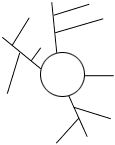
|

[ Learning Home ][ Topics
Menu ][ Study Skills ][Concepts
of Learning ]
[ Web Site Resources ][ BC3
Help Resources ][ Learning Site Map ]

Subject: Notetaking_________________ Date:
11/20/98_____
|
Main Ideas
|
Details
|
|
Cornell
notes
Semantic map or web

|
- Can be used to provide an outline of the course, chapter,
or lecture.
- Organized by main ideas and details.
- Can be as detailed as necessary.
- Sequential-- take notes as they are given by instructor or
text in an orderly fashion.
- After class, write a summary of what you learned to clarify
and reinforce learning and to assist retention.
- Can be used as study tool:
- Define terms or explain concepts listed on the left side.
- Identify the concept or term based on its definition
on the right side.
- Can be used to provide a "big picture" of the course, chapter,
or lecture.
- Organized by main ideas and sub-topics.
- Limited in how much detail you can represent.
- Simultaneous - you can use this method for instructors who
jump around from topic to topic.
- After class, you will probably need to "translate" notes
into a Cornell format.
- Can be used as a study tool -- to get a quick overview and
to determine whether you need more information or need to concentrate
your study on specific topics.
|
|
Summary:
There are a couple of ways that you can take notes. The Cornell
method is best when the information is given in a sequential, orderly
fashion and allows for more detail. The semantic web/map method
works best for instructors who skip around from topic to topic,
and provides a "big picture" when you're previewing materials or
getting ready to study for a test.
|
Download
this document as a Word 97 file
Download
the free Microsoft Word Viewer
Developed by Meg Keeley
Special Populations
Office, Bucks County Community College
With funding from the Carl D. Perkins Vocational and Applied
Technology Education Act
Designed and Produced by Chimera Studio
Copyright 1997 Bucks County Community College. All rights
reserved.
Author: keeleym@bucks.edu
|